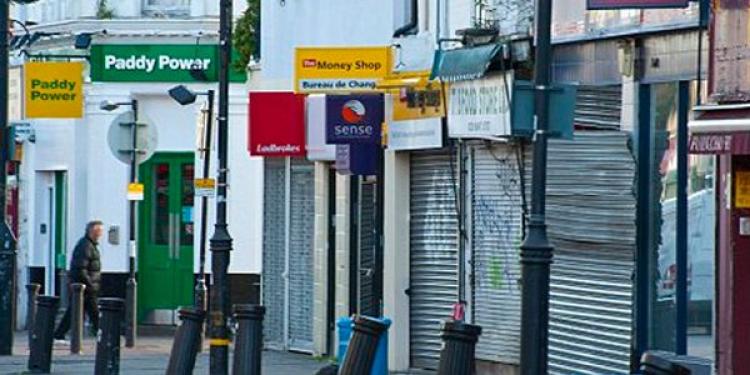2014 Has Been a Brutal Year for UK Bookmakers, But there is Reason to Bet on a Recovery
Posted: September 28, 2014
Updated: June 4, 2017

The British government went after sportsbooks with a vengeance this year, but there are plenty of reasons to believe that the industry’s fortunes will revive.
UK politicians are always looking for a scapegoat. Rather than be honest with the public and admit that society’s problems require complex solutions that involve sacrifice and hard choices, they too often take the easy route and go after an easy target. Britain is grappling with a weak economy and the threat of Scottish separatism (the referendum failed last weekend, but London will need to grant the Scots more autonomy). Recently the target of choice has been the sportsbetting industry.
David Cameron, George Osborne and company are making a political circus out of making life as difficult as possible for high street bookmakers like William Hill, Ladbrokes, Paddy Power, Bet365 and Coral Gala as well as smaller operations. That (temporarily at least) has satisfied the anti-gambling crowd and distracted the country from the negative headlines they wake up to every morning.
Bookies take a series of blows to the face in 2014
Serving as the government’s punching-bag of choice was a role played repeatedly by bookmakers this year. The most obvious example was the take hike on fixed-odds betting terminals (FOBTs), with the rate jumping from 20 percent to 25 percent. That number may not jump off the page, but it was enough to force the closure of hundreds of betting shops across the country, many of which are small, family-run businesses. And the hike came only a year after the rate was increased to 20 percent.
• Tax increases forced hundreds of UK bookmakers to shut their doors in 2014
• Offshore sportsbooks are now required to pay a 15 percent tax on all revenue
• Despite the bad year, look for bookies to bounce back
Now that most bets are placed with online and mobile betting sites old-fashioned betting shops have been scrambling for new sources of revenue just to keep their doors open. Offering FOBTs was one way to do that. In the wake of clampdown William Hill’s share price fell by 7 percent and Paddy Power saw a 3 percent drop. Ladbrokes fell the hardest, 12 percent, due to the fact that it has more money invested in betting shops rather than its online operation.
And that was just getting things warmed up. The Excequer also opted to extend the horse racing levy to revenue earned from offshore horse betting services as well as that earned at racetracks and in off-track betting shops. Many voices consider that to be completely reasonable, but the truth is that most of the major bookmakers (William Hill especially) moved their online operations offshore in order to make up for the excessive taxes eating into their profit margins.
On a similar note, Osbourne announced that starting in December 2014 the government would require all offshore bookmakers serving UK customers to pay a 15 percent point-of-consumption (PoC) tax, the same rate which is paid by high street betting shops. Again, we’re all for a level playing field, but these companies moved offshore because the PoC was simply too high.
Additionally, UK sportsbooks got hit by something that had nothing to do with British gambling laws. It was a very good year for punters, especially in football, the bread-and-butter of British bookies. The lack of high-profile upset matches meant that lots of money went into the pockets of bettors taking the short odds. This was especially true in the World Cup, which was dominated by favorites. But while things have been brutal for bookies so, the truth is that the future looks brighter than most people realize.
Why Britain’s bookies are bound to bounce back
There was plenty of bad news this year, but there is good news going forward. The first is that “big four” bookmakers (Hill, Paddy, Ladbrokes and Coral) have wised up and are responding by cleaning up their advertising practices. They’ve agreed to take down FOBT ads in betting shop windows and are voluntarily funding an independent watchdog to keep tabs on advertising practices.
In the recent past the government has been able to scapegoat bookies because they didn’t do enough to cultivate a positive perception in the public eye. Now that they’re cleaning up their act voluntarily they won’t be an easy target anymore.
The industry should also see addition by subtraction. The closure of hundreds of small betting shops will open up the market for those profitable enough to stay in business, namely the big bookies. These companies will benefit from lower operating costs but a still huge market of British bettors.
And now that bookies have had some time to respond to the recent changes and online sportsbooks in the UK have the rest of the year to prepare for the upcoming PoC tax. The truth is that things hit rock-bottom in 2014 and the market is bound to rebound.
And don’t forget this very simple fact: Britons are absolutely crazy about betting on sports, especially football. As long as sports and Britons exist on the same planet there will be money to be made in the business of betting. And the big bookmakers have gradually diversified into other revenue sources like online casino gaming, internet and mobile betting, and casino gambling.
At the end of the day, the UK government can’t push the bookmakers down but they can’t push them out. Expect the industry to come back in slimmer, more efficient and smarter-than-ever form. Cameron and Osbourne will need to find a new scapegoat for the country’s problems.













